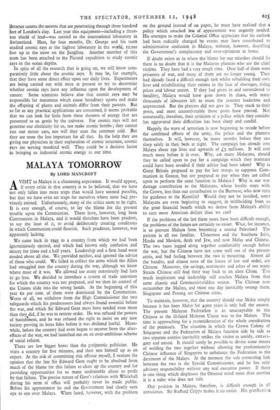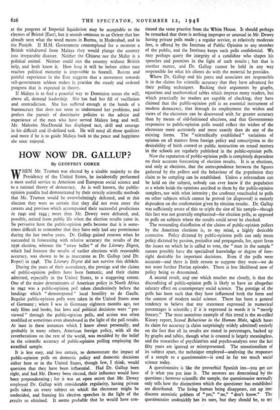MALAYA TOMORROW
By LORD MANCROFT
AVISIT to Malaya is a chastening experience. It would appear, if every critic in that country is to be believed, that we have not only fallen into more traps than would have seemed possible, but that we have even set traps for ourselves where none had pre- viously existed. Unfortunately, many of the critics seem to be right. It is easy enough, of course, to lay the blame for the present trouble upon the Communists. There have, however, long been Communists in Malaya, and it would therefore have been prudent, to say the least of it, to avoid deliberately creating conditions in which Communism could flourish. Such prudence, however, was apparently lacking.
We came back in 1945 to a country from which we had been ignominiously ejected, and which had known only confusion and misery for three and a half years. Leadership and a firm hand were needed above all else. We provided neither, and ignored the advice of those who could. We failed to collect the arms which the Allies had smuggled into the country during the war, although we knew where most of it was. We allowed too many notoriously bad hats to go free. We decided to introduce a system of trade unionism for which the country was not prepared, and we then let control of the Unions slide into the wrong hands. As the beginning of this year 6o per cent. of them were dominated by the Communists. Worst of all, we withdrew from the High Commissioner the two safeguards which his predecessors had always found essential before the war, and which Sir Edward Gent must have needed even more than theydid, if he was to restore order. He was refused the powers of banishment, and he was refused the right to insist on any new society proving its bona fides before it was declared lawful. Mean- while, before the country had even begun to recover from the after- effects of the war, we had launched out on an over-ambitious scheme of social reform.
There are few bigger bores than the peripatetic politician. He visits a country for five minutes, and then sets himself up as an expert. At the risk of committing this offence myself, I venture the opinion that the late Sir Edward Gent ought to be absolved from much of the blame for this failure to clean up the country and for providing opportunities for so many undesirable aliens to profit by that failure. The precise nature of Gent's relations with Whitehall during his term of office will probably never be made public. Before his appointment he and the Government had clearly seen eye to eye over Malaya. When faced, however, with the problem on the ground instead of on paper, he must have realised that a policy which smacked less of appeasement was urgently needed. His attempts to make the Colonial Office appreciate that his outlook had been radically changed by events may have contributed to administrative confusion in Malaya, without, however, dispelling the Government's complacency and over-optimism at home.
If doubt exists as to where the blame for our mistakes should lie there is no doubt that it is the Malayan planters who are the chief victims. They have had a very rough time. Over half of them were priners of war, and many of them are no longer young. They had eady faced a difficult enough task whilst rebuilding their own lives an rehabilitating their estates in the face of shortages, rising prices anlabour unrest If they had given in and surrendered to banditry,1: Malaya would have gone down in chaos, with many thousands of labourers left to roam the country leaderless and unprotected. But the planters did not give in. They stuck to their posts, and most uncomfortable those posts have proved. Not unnaturally, therefore, their criticism of a policy which they consider has aggravated their difficulties has been sharp and candid.
Happily the wave of terrorism is now beginning to recede before the combined efforts of the army, the police and the planters themselves. It will, however, be many months before they can sleep safely in theif beds at night. The campaign has already cost Malaya about 250 lives and upwards of £3 millions. It will cost much more before it is over. Why, ask many Malayans, should they be called upon to pay for a campaign which they maintain could have been avoided if their advice had been taken? Why is Great Britain prepared to pay for her troops to suppress Com- munism in Greece, but not •prepared to pay when they are called upon to perform the same function in Malaya ? Why is our war damage contribution to the Malayans, whose loyalty stays with the Crown, less than our contribution to the Burmese, who now turn for guidance to the Kremlin? Would they not be justified, some Malayans are even beginning to suggest, in withholding from us the great financial benefit which we derive from Malaya's ability to earn more American dollars than we can?
If the problems of the last three years have been difficult enough, the problems of the future are certainly no easier. What, for instance, is to prevent Malaya from becoming a second Palestine? The pattern is all too familiar. Ulstermen and the Southern Irish, Hindu and Moslem, Arab and Jew, and now Malay and Chinese. The two races jogged along together comfortably enough before the war, but the Chinese have not come well out of the present crisis, and bad feeling between the two is mounting. Almost all the bandits, and almost none of the forces of law and order, are Chinese. Moreover, the savings, sentiments and ashes of too many Straits Chinese still find their way back to an alien China. Too much inspiration and leadership still reaches Malaya from that same chaotic and Communist-ridden source. The Chinese now outnumber the Malays, and must one day inevitably swamp them. Singapore and Penang are Chinese cities.
To maintain, however, that the country should stay Malay simply because it has been Malay for 4,000 years is only half the answer. The present Malayan Federation is as unacceptable to the Chinese as the ill-fated Malayan Union was to the Malays. The time is approaching for a reconsideration of the whole constitution of the peninsula. The situation in which the Crown Colony of Singapore and the Federation of Malaya function side by side as two separate entities inevitably strikes the visitor as untidy, extrava- gant and unreal. It should surely be possible to devise some means of welding the two together without allowing the predominantly Chinese influence of Singapore to unbalance the Federation to the detriment of the Malays. At the moment the sole connecting link between the two is the Special Commissioner, and he has only advisory responsibility without any real executive power. If there is one thing which displeases the Oriental mind more than another it is a ruler who does not rule.
Our position in Malaya, therefore, is difficult enough in all conscience. Sir Stafford Cripps makes it no easier. His gratification at the progresi of Imperial liquidation may be acceptable to the electors of Bristol (East), but it sounds ominous to an Orient that has already seen what the word means in Burma, in Hyderabad, and in the Punjab. If H.M. Government contemplate(I for a moment a British withdrawal from Malaya they would plunge the country into irreparable disaster. Neither the Chinese nor the Malay is a political animal Neither could run the country without British help, and both know it. How long it will be before either race reaches political maturity is impossible to foretell. Recent and painful experience in the East suggests that a movement towards self-government seldom makes in practice the steady and ordered progress that is expected in theory.
If Malaya is to find a peaceful way to Dominion status she will, above all, demaild leadership. She has had her fill of vacillation and contradiction. She has suffered enough at the hands of a bureaucracy that does not seem to understand her problems, and prefers the pursuit of doctrinaire policies to the advice and experience of the men who have served Malaya long and well. Mr. Malcolm MacDonald has displayed tact, skill and courage in his difficult and ill-defined task. He will need all those qualities and more if he is to guide Malaya back to the peace and happiness she once enjoyed.



































 Previous page
Previous page